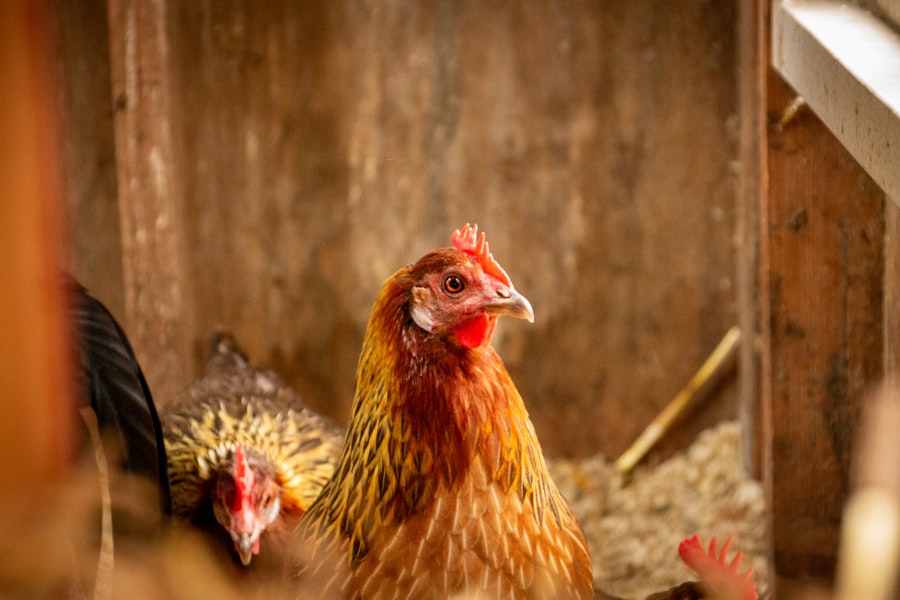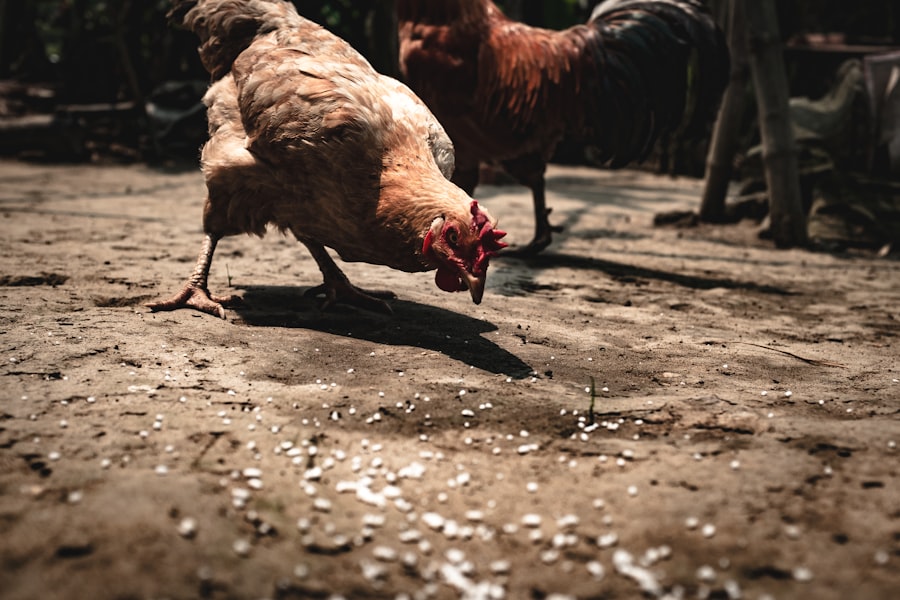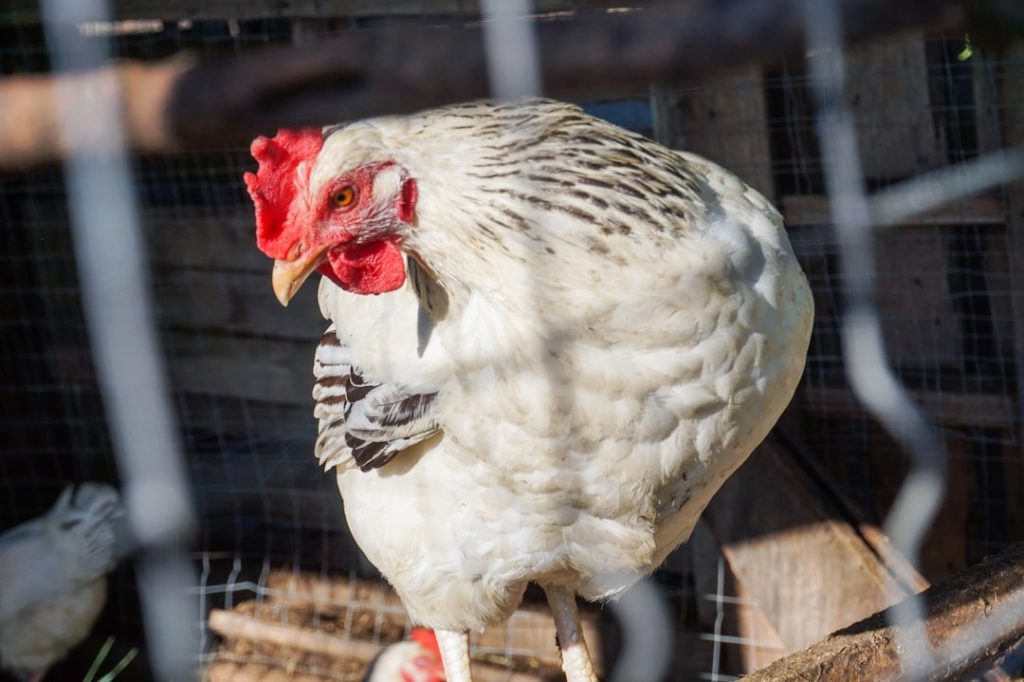Chickens are social creatures that thrive in structured environments. They establish a hierarchical pecking order, with dominant individuals asserting authority over subordinates. This behavior is crucial to consider when designing chicken coops and runs.
Adequate space must be provided for each bird to establish its territory, reducing aggression. Chickens are naturally inquisitive and will explore their surroundings, necessitating a secure environment to prevent escape and protect from predators. Roosting and nesting behaviors are important aspects of chicken husbandry.
Chickens prefer to roost off the ground at night, making elevated roosting spaces essential in coop design. Nesting boxes for egg-laying should be placed in quiet, secluded areas to provide privacy and encourage consistent egg production. Understanding and accommodating these natural behaviors creates a comfortable, low-stress environment for chickens, promoting their health and well-being.
Table of Contents
- 1 Building a Secure Chicken Coop
- 2 Creating a Safe and Enclosed Chicken Run
- 3 Implementing Proper Fencing
- 4 Providing Adequate Food and Water
- 5 Regularly Checking for Escaping Opportunities
- 6 Training and Supervising Your Chickens
- 7 FAQs
- 7.1 What are some effective ways to keep my chickens in my yard?
- 7.2 What type of fencing is best for keeping chickens in my yard?
- 7.3 How can I use electric fencing to keep my chickens in my yard?
- 7.4 What are some features to look for in a chicken coop to keep chickens in my yard?
- 7.5 Are there any plants or landscaping features that can help keep chickens in my yard?
Key Takeaways
- Chickens are social animals and have a natural instinct to roost, scratch, and forage for food.
- A secure chicken coop should have strong and durable materials, proper ventilation, and predator-proof locks.
- A safe and enclosed chicken run should provide enough space for the chickens to move around and should be covered with wire mesh to prevent predators from entering.
- Proper fencing around the coop and run is essential to keep predators out and chickens in.
- Providing adequate food and water is crucial for the health and well-being of the chickens.
Building a Secure Chicken Coop
Protecting from Predators
It’s important to use high-quality materials and ensure that all openings are securely covered with wire mesh to prevent any potential threats from entering the coop.
Providing a Healthy Environment
The coop should have proper ventilation to maintain good air quality and prevent the buildup of moisture, which can lead to respiratory issues in chickens. The size of the coop is also crucial, providing enough space for the chickens to move around comfortably, with at least 2-3 square feet per bird.
Essential Features and Maintenance
The coop should also have nesting boxes for egg-laying and roosting bars for the chickens to perch on at night. It’s important to keep the coop clean and free of any debris or waste to prevent the spread of disease. By building a secure and well-designed chicken coop, you can ensure the safety and well-being of your flock.
Creating a Safe and Enclosed Chicken Run

In addition to a secure coop, chickens also need access to an outdoor run where they can forage, dust bathe, and exercise. The chicken run should be enclosed with wire mesh to prevent predators from entering and provide a safe space for the chickens to roam freely. It’s important to bury the wire mesh at least 12 inches into the ground to prevent predators from digging underneath and gaining access to the run.
The size of the chicken run is also important. It should provide at least 10 square feet per bird to allow for ample space for exercise and natural behaviors. Providing enrichment such as perches, dust bathing areas, and vegetation can also help keep the chickens entertained and reduce stress.
Additionally, it’s important to regularly inspect the run for any signs of wear or damage to ensure that it remains secure and predator-proof.
Implementing Proper Fencing
Proper fencing is essential for keeping chickens safe and contained within their designated areas. The fencing should be tall enough to prevent the chickens from flying over and escaping, typically at least 6 feet high. Additionally, the fencing should be buried at least 12 inches into the ground to prevent predators from digging underneath and gaining access to the chicken area.
When choosing fencing material, it’s important to select a durable and predator-resistant option such as welded wire or hardware cloth. Regularly inspecting the fencing for any signs of wear or damage is crucial to ensure that it remains secure and effective. Proper fencing not only keeps chickens safe but also helps protect them from potential threats such as predators and neighboring animals.
Providing Adequate Food and Water
Chickens require a balanced diet to maintain their health and well-being. Providing access to fresh water at all times is crucial, as dehydration can lead to serious health issues in chickens. Additionally, chickens need a diet that includes a mix of grains, protein, vitamins, and minerals to support their overall health and egg production.
Feeding chickens a balanced diet that meets their nutritional needs is essential for their health and productivity. It’s important to provide access to commercial chicken feed as well as supplemental treats such as fruits, vegetables, and mealworms. Additionally, providing access to grit and oyster shells can help support digestion and eggshell formation.
Regularly checking food and water supplies and ensuring that they are clean and free of contaminants is crucial for maintaining the health of your flock.
Regularly Checking for Escaping Opportunities

Regular Inspections are Key
Regularly inspecting the coop, run, and fencing for any potential escape routes is crucial for preventing chickens from wandering off or being exposed to predators. This includes checking for any gaps or holes in the fencing, loose or damaged wire mesh, or areas where predators could potentially gain access.
Monitoring Chicken Behavior
Additionally, it’s important to monitor the behavior of the chickens for any signs of restlessness or attempts to escape. Chickens that are trying to escape may exhibit certain behaviors, such as pacing back and forth along the fencing or trying to fly over the enclosure.
Addressing Potential Issues
Addressing any potential escape routes promptly can help prevent potential issues and keep your flock safe and contained within their designated area. By staying vigilant and taking proactive measures, you can ensure the safety and well-being of your chickens.
Training and Supervising Your Chickens
Training and supervising your chickens can help reinforce boundaries and prevent them from escaping or getting into trouble. By spending time with your flock and establishing yourself as a source of authority, you can help teach them where they are allowed to go and what behaviors are acceptable. This can include using positive reinforcement such as treats or praise when they exhibit desired behaviors such as returning to the coop at night.
Supervising your chickens regularly can also help you identify any potential issues or escape attempts early on. By being present in their environment, you can monitor their behavior and address any potential problems before they escalate. Additionally, spending time with your flock can help strengthen your bond with them and create a more harmonious relationship between you and your chickens.
In conclusion, understanding the behavior of chickens is crucial for creating a safe and secure environment for your flock. By building a secure coop, creating a safe and enclosed run, implementing proper fencing, providing adequate food and water, regularly checking for escaping opportunities, and training and supervising your chickens, you can ensure the safety and well-being of your flock while allowing them to exhibit natural behaviors in a controlled environment.
If you’re looking for more information on keeping poultry in your yard, you might be interested in learning about the incubation period for goose eggs. Check out this article to learn more about the process of hatching goose eggs and how to care for the young goslings.
FAQs
What are some effective ways to keep my chickens in my yard?
Some effective ways to keep your chickens in your yard include using fencing, chicken wire, electric fencing, and chicken coops.
What type of fencing is best for keeping chickens in my yard?
The best type of fencing for keeping chickens in your yard is typically a sturdy wire or mesh fencing that is at least 6 feet tall and buried at least 6 inches into the ground to prevent digging.
How can I use electric fencing to keep my chickens in my yard?
Electric fencing can be used to create a barrier around your yard to keep chickens in. It delivers a mild shock to deter chickens from trying to escape.
What are some features to look for in a chicken coop to keep chickens in my yard?
When selecting a chicken coop, look for one with a secure door, sturdy construction, and a predator-proof design to keep your chickens safe and contained in your yard.
Are there any plants or landscaping features that can help keep chickens in my yard?
Plants such as shrubs and hedges can create natural barriers to keep chickens in your yard. Additionally, landscaping features like raised beds and pathways can help define the boundaries of the chicken area.
Meet Walter, the feathered-friend fanatic of Florida! Nestled in the sunshine state, Walter struts through life with his feathered companions, clucking his way to happiness. With a coop that’s fancier than a five-star hotel, he’s the Don Juan of the chicken world. When he’s not teaching his hens to do the cha-cha, you’ll find him in a heated debate with his prized rooster, Sir Clucks-a-Lot. Walter’s poultry passion is no yolk; he’s the sunny-side-up guy you never knew you needed in your flock of friends!







